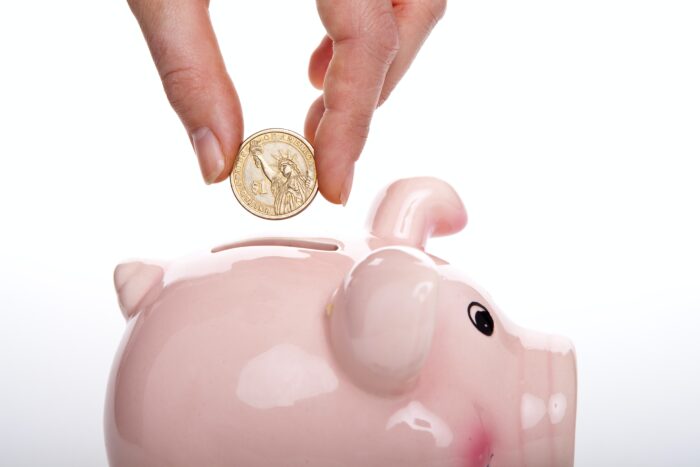
WHY A BUDGET IS SO IMPORTANT?
I know, I know – a budget sounds scary. However, it’s MUCH less scary once it’s complete and in front of you, as you’ll then know exactly what you’re dealing with.
This is the only way to identify what you can and can’t do in terms of cutting expenses, saving up, and paying debt, all with the goal of living a better life.
Like almost everything in life, when you look at it head-on, it becomes MUCH less frightening.
This is about your future, your freedom, and a path to a life you may not have had otherwise. We don’t realize how the subconscious worry of the unknown is constantly in the back of our mind, draining our energy and keeping us from potentially doing and being something GREAT.
This is the first step to taking back control, taking back your energy, and creating a future that’s real, and which is possible as long as you take that first step.
In other words, there are lots of UPSIDE and very FEW downsides. Plus, and you can do it all in a single afternoon.
Let’s get started!
STEP 1 | GET YOUR BANK AND CREDIT CARD STATEMENTS IN ORDER
To AVOID panic and becoming overwhelmed, do things ONE step at a time. Don’t get statements and then start going through each of them and freaking out about what stresses you out.
If they’re paper statements, get them all together and pile them up. If they’re digital, make a folder on your computer marked “Budget Statements”. When you name the statements within the folder, name them something you’ll remember that are easy to go back and reference days later, such as “WellsFargo-CreditCard-June”.
So that you don’t miss any spending patterns, gather the last TWO statements for each bank or credit card account you have.
When you have the statements ready, don’t just tear into them without a plan. Instead, ignore the statements for now and MOVE ON to the next step, which is going to be the way you organize and track the budget and monitor your overall progress over time.
STEP 2 | CREATE A SIMPLE SPREADSHEET OF PAYMENT DATES (WHERE AND HOW THEY ARE PAID)
This concept is based on creating a simple spreadsheet, but if you like, you can keep the same format in a notebook, which will also work just fine.
- Importance (***critical, **important but not essential, *cut out immediately)
- Vendor
- Amount
- Due Date
- Frequency (monthly, quarterly, yearly)
Keep it SUPER SIMPLE. Your goal in this step is to be able to immediately see on one page what you’re dealing with. It’s about identifying what’s TRULY important and what’s not. This will get you to focus and ruthlessly eliminate things that you spend on that don’t even matter to you.
It’s difficult enough to keep track of everything going on in your life, and it’s IMPOSSIBLE to remember everything you’re spending on only from memory. However, this is actually a good thing, as you’ll be shocked to see what you may be spending on that you can eliminate with zero effect on your quality of life.
Remember, the battle is won with the LITTLE things.
STEP 3 | CREATE A KEY AT THE TOP OF YOUR SHEET FOR IMPORTANCE
Having a key at the top of your sheet is VERY important. If you don’t have a way to quickly identify what is critical, important, and not important, everything becomes important, which will quickly overwhelm you.
In addition, once you make your budget and set your goals, if you come back to them in a few weeks, you’ll have to spend time thinking all over again about what’s critical, not so important, etc. Nobody’s memory is good enough to remember all this information along with the REAL life issues they have to attend to as well.
This will save you a ton of time in “repetitive thinking” and “context switching”, which affect the overall brain energy you have allotted for that day.
Think of it simply as having a process to save you both time and energy.
STEP 4 | FOCUS ON THE CRITICAL EXPENSES FIRST
So, how do you determine what’s critical and what’s just important? ‘Critical’ is something that if you didn’t pay for, you would be homeless or starving, or which would impact your livelihood to such an extent that you could no longer support yourself in society.
For instance, you need a place to live and you need food. You can’t avoid paying the rent or mortgage without dramatically negative consequences. You can’t not buy groceries, as you need food to live.
If you work from home and need to use the internet to work, this also belongs in the CRITICAL category. If you don’t work from home and your internet is purely for entertainment purposes, this would not be in the critical category. Likewise, your night out for dinner and wine does not fall into the critical category of food. In this context, food is groceries that will sustain your life as a human.
Examples of ‘critical’ are as follows:
- Rent/Mortgage
- Groceries (this does not include dining out)
- Utilities (Electricity/Gas/Water)
- Internet (if you use it for work)
- Phone (If you use it for work)
Now, let’s move on to defining what expenses are important but not critical.
STEP 5 | DIVE INTO THE IMPORTANT EXPENSES
‘Important’ here means those things that are NOT life-sustaining but are important enough to where it would affect you negatively if you did not have it. Assuming you don’t depend on your phone or internet to make money, those two would fall into this category.
Remember, if you do depend on your phone or internet to make money, these should go back up into the critical area.
Examples of ‘important’ are as follows:
- Internet
- Phone
- Clothes (only enough to be genuinely useful, not fashionable)
- Gym membership (if you go 3+ times a week, this stays as important. Any less and it may be better to find another way to work out 1-2 times a week and eliminate this expense, i.e. doing home workouts or running outside).
Now that you’ve identified what’s critical and what’s important, everything else would be in the non-important category.
Of course, this doesn’t mean you have to eliminate everything in this category – it’s just a quick way to identify the things you CAN live without if it comes down to choosing those things OR a better future for yourself.
STEP 6 | DIVE INTO THE NON-IMPORTANT EXPENSES
The ‘non-important’ category is made up of things that you can not only do without, but which also often waste your time and should likely be eliminated – or if not eliminated, then at least minimized to reduce things that are taking MORE away from you than they are GIVING back.
Examples of things that can be eliminated are as follows:
- Traditional TV
- Online subscriptions (if you have more than ONE)
- Video games (unless you’re a pro gamer and making money from this)
- Eating out
- Nights out drinking
- Happy hour with co-workers (unless it actually will help your career, but in this case, we’re assuming it does not)
- Excessive clothes shopping
- Excessive shoe shopping
- Excessive accessory shopping
- Buying something to impress someone else
- Watches
- Vehicles that are not used for essential transportation
By now, you have a clear roadmap to what is critical, important, and non-important, which means you can see right in front of you the things that are possible to change.
You’re able to understand what’s truly important to you and what you could easily live without.
Now it’s time for the final step: setting your budget goals.
STEP 7 | SET YOUR BUDGET GOALS

The first thing to identify is what YOU want out of your life. Ignore what you think everyone else wants you to do. YOUR budget is YOUR budget – if you don’t want to eliminate things, then don’t.
A budget is just a guide to show you what paths you can take based on what’s really important to you.
I would recommend starting with the following filter questions:
- What do you want out of this budget? E.g. not having to live paycheck to paycheck, increasing your savings, paying off debt, being able to retire earlier.
- What small steps can you take that have the highest impact now?
- What dollar amount would you like to save by using a budget?
- What little things are you spending on that don’t bring you much happiness?
- How much are you spending per month on those little things?
I know that right now, it may not sound realistic. However, you really can CHANGE the COURSE of your ENTIRE life by creating a budget and attaching goals to it.
The nice thing about this concept is that it’s FREE to do, and with a little guidance and personal effort, absolutely ANYONE can learn to become good.
Paul Martinez is the founder of BendingDestiny.com. He is an expert in the areas of finance, real estate, and eCommerce.
Join him on BendingDestiny.com to learn how to improve your financial life and excel in these areas. Before starting this blog, Paul built from scratch and managed two multi-million dollar companies. One in the real estate sector and one in the eCommerce sector.


